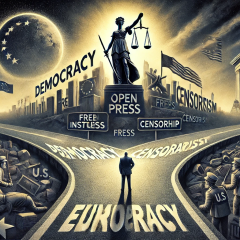What Can We Learn from the U.S.?
Introduction
In recent years, the United States has undergone a deep political and moral shift. From polarization and populism to the erosion of democratic institutions, the warning signs are clear. But Europe is not immune to these trends. Similar symptoms are emerging in various European countries. The question is: what can we learn from the American situation to prevent Europe from heading down the same path?
Right-Wing Populism and Authoritarian Tendencies
In countries like Hungary and Poland, governments have attempted to undermine the judiciary and restrict press freedom. In Italy and France, far-right movements are gaining popularity. Just like in the U.S., democracy is increasingly challenged by leaders who claim to represent 'the will of the people' while weakening the institutions that keep them in check.
Polarization and Disinformation
Social media and alternative news platforms play a crucial role in spreading disinformation and deepening ideological divides. As in the U.S., political discussions in Europe are increasingly dominated by conspiracy theories and emotional rhetoric, making constructive dialogue more difficult.
Erosion of Democratic Institutions
In the U.S., the judiciary has played a crucial role in approving or blocking controversial legislation. In Europe, judicial independence is also under pressure, particularly in countries where governments seek to influence judicial appointments and rulings. Additionally, journalists and academics are increasingly targeted with intimidation, threatening the free exchange of ideas.
The Role of the EU and National Governments
The European Union has mechanisms to protect democratic values, such as sanctions and legal proceedings against member states that undermine the rule of law. However, these measures are slow and often face political resistance. National governments also have a responsibility to defend democratic principles, but in some cases, they are the driving force behind authoritarian tendencies.
Lessons for Europe
- Strengthening Democratic Checks and Balances – Independent judiciary, free press, and transparent election processes are crucial to protecting democracies from power abuse.
- Investing in Political Education – A well-informed citizenry is less susceptible to disinformation and extremist rhetoric.
- Countering Polarization – Political parties and media should promote dialogue rather than deepen divisions.
- A Stronger European Response – The EU must develop more effective mechanisms to act quickly and decisively against member states drifting toward authoritarianism.
Conclusion
Europe stands at a crossroads: it can learn from the U.S. and strengthen its democratic foundations, or it can repeat the same mistakes and watch as institutions and freedoms are slowly eroded. The choice lies with citizens, politicians, and policymakers. The question is whether we are willing to take action before it is too late.

